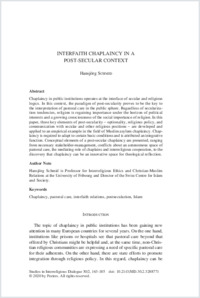Interfaith Chaplaincy in a Post-Secular Context
BHT
- Hansjörg, Schmid ORCID Centre Suisse Islam et Société, Université de Fribourg
- 2020
Published in:
- Studies in Interreligious Dialogue. - 2020, no. 2, p. 163-185
English
Chaplaincy in public institutions operates at the interface of secular and religious logics. In this context, the paradigm of post-secularity proves to be the key to the interpretation of pastoral care in the public sphere. Regardless of secularization tendencies, religion is regaining importance under the horizon of political interests and a growing consciousness of the social importance of religion. In this paper, three key elements of post-secularity – optionality, religious policy, and communication with secular and other religious positions – are developed and applied to an empirical example in the field of Muslim asylum chaplaincy. Chaplaincy is required to adapt to certain basic conditions and is attributed an integrative function. Conceptual elements of a post-secular chaplaincy are presented, ranging from necessary stakeholder-management, conflicts about an autonomous space of pastoral care, the mediating role of chaplains and interreligious cooperation, to the discovery that chaplaincy can be an innovative space for theological reflection.
- Faculty
- Rectorat
- Department
- Centre Suisse Islam et Société
- Language
-
- English
- Classification
- Religion, theology
- License
- License undefined
- Open access status
- green
- Identifiers
- Persistent URL
- https://folia.unifr.ch/unifr/documents/328271
Statistics
Document views: 36
File downloads:
- Schmid_Interfaith_chaplaincy_in_a_postsecular_context_2020.pdf: 126
